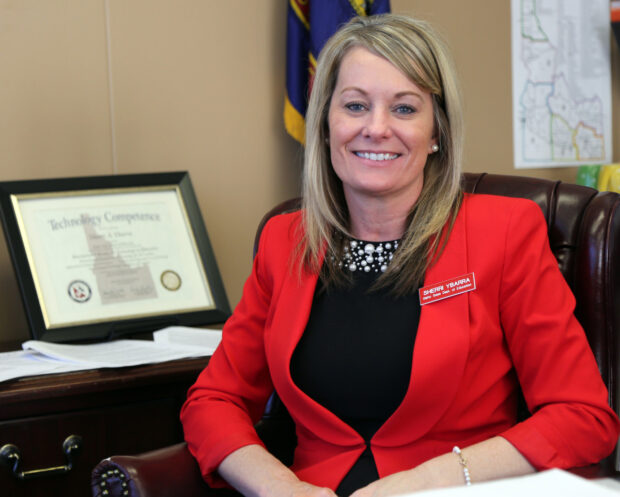Administrators from three additional school districts have confirmed errors in a state report on teacher evaluation data released last week by the State Department of Education.
The report details evaluations data for more than 17,000 teachers in all 115 school districts and charter schools. It showed that administrators reported more than 91 percent of all teachers earned high marks on their evaluations from the 2015-16 school year.
The errors discovered this week were made for a variety of reasons. Administrators raised deadline issues; said they incorrectly filled out forms; and district leaders admitted the numbers they reported were incorrect.
Idaho Education News contacted leaders of nine school districts since the report was released Thursday. Administrators in seven districts confirmed errors or omissions.
The nature and frequency of the errors means the statewide data is worthless for differentiating between high-performing and lower-performing teachers in Idaho.
Teacher evaluations are increasingly important, because the 2015 Legislature partially tied hundreds of millions of dollars in taxpayers’ money to teacher evaluations through the career ladder salary law.
State Department of Education spokesman Jeff Church said this year’s evaluation data won’t be used to direct the flow of state money into teacher pay. But next year, Church said, evaluations will be a factor in educators’ ability to earn higher pay.
If state education leaders had used the data released Thursday to determine salary funding levels, the errors likely would have resulted in thousands of dollars in taxpayers’ money being misspent.
New inconsistencies
Since first publishing an account of the error-filled report, EdNews has uncovered additional errors — all confirmed by administrators.
Post Falls School District. Employees inaccurately reported all 301 teachers earned identical overall scores of “proficient,” a three on a four-point scale. Superintendent Jerry Keane said district staffers knowingly submitted inaccurate data in order to meet a state reporting deadline.
“For some reason it was better to enter all threes and meet the timeline than wait until they could make the modifications to our business software in order to enter the correct data,” Keane wrote in an email to EdNews.
Keane supplied new data to EdNews Monday that showed 261 Post Falls teachers earned scores of “proficient.” Another 51 educators earned scores of “distinguished,” seven teachers earned scores of “basic” and one teacher earned an “unsatisfactory” score.

Kuna Joint School District. Superintendent Wendy Johnson also said her district reported that all 292 teachers earned identical scores of “proficient” in order to meet the state deadline.
“I would imagine our data is not correct,” Johnson said. “The reason for that is we haven’t had the chance to scrub some of our data.”
Teacher evaluations must include a classroom observation and student achievement data. Johnson said it was difficult to meet the reporting deadlines, since state law requires evaluations to be complete May 1 — before the end of the school year.
A new state law will extend that deadline by 30 days for 2017.
Johnson said she will work with district employees to correct any erroneous data and submit accurate data this summer.
“I don’t want to sound like we’re not taking this seriously — we do take it seriously,” Johnson said.
Johnson said district staffers were concerned about meeting the deadline and did not want to jeopardize the receipt of state funding or summer school activities, so they filed inaccurate “placeholder” data.
Lewiston School District. Assistant Superintendent Lance Hansen said his district incorrectly reported all 285 teachers performed at “proficient” levels.
When contacted last week by EdNews, Hansen said the data was accurate. But “proficient” is the highest possible score in Lewiston because that district does not choose to award “distinguished” scores. EdNews asked Hansen if any Lewiston teachers were disciplined or suspended during the most recent academic school year.
“Not all of them were proficient — it’s off by one,” Hansen then said.
Shelley School District. Superintendent Bryan Jolley said he did not prepare his district’s report. A retired district employee who prepared the report was “unavailable,” he said.
Shelley’s data indicated 112 of 113 teachers all earned identical evaluation scores of “proficient.” Data for the 113th teacher was not reported, and Jolley was unsure why. After checking, Jolley told EdNews Shelley employs 125 instruction staff members, including administrators and directors.
When asked if Shelley’s data was accurate and complete Jolley said, “I honestly couldn’t tell you.” Then Jolley said he “would hope” all of his teachers are performing at proficient levels.
Jolley also said he was unsure how Shelley reported its data to the state but assumed that the retired staffer emailed building principals to ask if any teachers were suspended or unsatisfactory.
The retiree likely told principals to “let me know, otherwise this is what I will put in (the report),” Jolley said.
A checkered history
This is the second consecutive year that multiple Idaho superintendents have told EdNews their district purposely and falsely awarded identical overall evaluation scores.
Last year, now-retired New Plymouth Superintendent Ryan Kerby and Sugar-Salem Superintendent Alan Dunn told EdNews they intentionally gave all teachers identical scores because it wasn’t any of the state’s business and they wanted to protect their employees, respectively.
Last year, 32 school districts or charter schools awarded all employees identical overall evaluation scores. This year, that numbered jumped to 35 — even though the accuracy of evaluations was called into question by Gov. Butch Otter’s office and became a talking point during the legislative session.

Over the past year, Superintendent of Public Instruction Sherri Ybarra said EdNews’ repeated inquiries about the evaluations data has amounted to “loaded questions.”
Again on Friday, Church declined to comment about the undisputed explanations from superintendents Dunn and Kerby, made months ago and backed up by the state’s own datasets.
However, last July, Ybarra called for more training in teacher evaluations and acknowledged the data may not be accurate.
Mixed results
Some of the identical evaluation scores are accurate, however.
Garden Valley Superintendent Greg Alexander confirmed that his data is accurate — 21 of 21 teachers earned a “proficient” mark.
“We hire people who are proficient and right now they all are proficient,” Alexander said.
Alexander added that some of his teachers may be “distinguished,” but he only has been with the district one year and needs more observation time to identify the highest achievement.

But as EdNews already reported last week, nearly all of the evaluation data submitted by the Fremont County and McCall-Donnelly school districts were inaccurate and unusable because of their own reporting errors.
Additionally Boise’s evaluation data was incomplete because administrators were unable to gather necessary signatures and input data into personnel files prior to the state’s reporting deadline. Boise officials said the evaluations themselves were completed on time and the missing data will be uploaded to the state next month.
EdNews data analyst Randy Schrader contributed research to this article and editor Jennifer Swindell contributed reporting.
